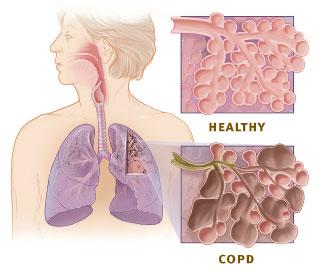If you suffer from COPD (chronic obstructive pulmonary disease), you already know that your symptoms and flare-ups can fluctuate depending on a host of different factors. Did you know that stress and anxiety can intensify your COPD symptoms?

April 16 is Stress Awareness Day – it’s the perfect time to reconsider your relationship with stress. We spoke to April Norman, moderator of the HOPE for COPD a social support network that provides COPD sufferers with a private space to discuss their condition with fellow patients, caregivers and families. She offered her tips for combating anxiety to improve overall well-being.
Here’s what you need to know about stress and COPD.
Stress and COPD Are Naturally Linked
According to Dr. Chris Iliades at Everyday Health, COPD and stress almost always go hand-in-hand. “Everybody has an alarm system deep in their brains,” he confirmed in a 2013 article. “If your breathing alarm system detects that you’re not getting enough air, it sends out a warning that feels like a sudden rush of anxiety.” That struggle to draw air can create “a constant source of stress” for COPD sufferers.

A study published in Multidisciplinary Respiratory Medicine found that 41.7% of study participants with COPD experienced anxiety, a heightened form of stress.
Your COPD-related stress is not going to cure itself. In fact, the more COPD progresses, the greater the chances that you will experience COPD-related stress on a daily basis.

The COPD Stress Cycle
If you suffer from COPD, you may already have experienced the “COPD Stress Cycle”:
- Stress causes your body to tense up.
- With tight muscles and a tense body, you struggle more than usual to draw in air.
- As you struggle to breathe, you experience heightened stress.
- More stress means more tension in your body, and the process starts over
Struggling with COPD Medical Costs
Medical bills may add another layer of anxiety to daily life for COPD sufferers. According to HOPE for COPD’s April Norman, sufferers may be blindsided by some of the costs associated with their condition. “My medications alone cost over $10,000 last year,” she said, “not to mention the out-of-pocket costs associated with supplements, vitamins, face masks, air purifiers, antibacterial supplies, and the rental, services, and supplies associated with an oxygen concentrator, expenses which many COPD sufferers must overcome.”

“These costs can easily exceed $1 million over a lifetime,” April said. “Even if insurance will cover most medical costs, co-pays and out-of-pocket costs will add up extremely quickly.”
Costs can include transportation and relocation expenses associated with a lung transplant. “Many hospitals have a ‘live within X miles’ request that they make to transplant candidates,” she said. “I live about 76 miles from my transplant hospital. In the winter, that two hours turns into four or more hours. The travel cost is around $130 for the round trip with gas, tolls, and food. These transportation costs add up.”
You will not be able to escape from the stress cycle without a conscious effort. Luckily, there are many ways to manage your COPD-related anxiety levels effectively.
Get Help When You Need It
Always tackle your stress with the help of your support team. If you begin to notice symptoms of depression, such as lack of interest in your favorite activities or feelings of guilt and hopelessness, discuss these feelings with your doctor immediately. While a degree of stress is normal for all of us, COPD sufferers or not, stress or depression can severely disrupt your life unless you take the time to manage your emotions.

You deserve relief from COPD-related stress! Today is the day to take your first steps towards healthy stress management. How will you begin? Share your stress management tips with other COPD sufferers on Facebook or on Twitter.
Discuss breaking COPD research by following HOPE for COPD on Twitter, and catch April’s firsthand insights on her blog.
Written by Emily Progin










